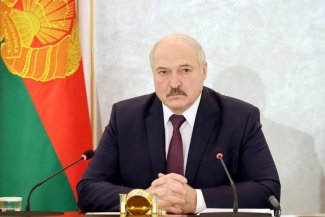Pressure being stepped up cautiously: the EU’s and US’s sanctions against Belarus

The rigged presidential election held in Belarus on 9 August 2020 and the brutal crackdown on the participants of post-election demonstrations triggered immediate criticism from the leaders of EU member states. These developments, combined with Alyaksandr Lukashenka’s unwillingness to engage in a dialogue with the opposition, resulted on 19 August 2020 in the EU deciding to prepare a set of sanctions involving a ban on more than 30 representatives of the regime entering the EU and freezing their assets. Due to the absence of unanimity among the EU member states, the sanctions were only imposed on 2 October 2020, when the US introduced its belated and mild visa restrictions. In Belarus, the crackdown continued, which prompted the EU to adopt, in November and December 2020, another two packages of sanctions (the latter targeting seven Belarusian businesses and other entities). The restrictions imposed by the EU and the US, albeit belated and cautiously approached, should be viewed as a symbolic gesture of disapproval which poses no direct threat to the regime, but which serves as a semblance of moral support for the rebellious majority of Belarusian society. In addition, in August 2020 the EU announced its assistance programme for the empowerment of civil society in Belarus.
The first reactions of the EU and the US to the crisis in Belarus
Within several days following the rigged election held on 9 August 2020 and the outbreak of social rebellion provoked by it, the leadership of the EU member states and the European Commission condemned the crackdown on demonstrators and called on the regime to stop the violence and open dialogue. The individual member states and the commission unanimously refused to recognise the election result, which resulted in Lukashenka’s legitimacy being challenged on the international stage. A similar message was expressed in joint statements – issued by both EU bodies and regional cooperation structures (e.g. the Visegrad Group).[1]
Belarus’s immediate neighbours, mainly Poland and Lithuania, were particularly active in reacting to the events ongoing there. At the request of Poland, backed by the Czech Republic, an extraordinary European Council summit was held on 19 August 2020, during which it was agreed that representatives of the regime responsible for acts of repression and electoral fraud should be banned from entering the EU.[2] The US Department of State and Congress have adopted a similar critical stance towards Minsk. However, President Donald Trump failed to express a stance on the matter. In addition, in a symbolic gesture the West was united in refusing to recognise the inauguration of Lukashenka’s subsequent term held on 23 September 2020. Thereby, Lukashenka has lost his status as legitimate president, although he continues to be viewed as the politician de facto holding power in Belarus.[3]
Alongside the sanction-related procedures, Brussels announced the launch of an assistance programme for the empowerment of civil society in Belarus, worth a total of EUR 53 million (a major portion of these funds has been earmarked for fighting the pandemic). Out of this sum, in 2020 a mere EUR 3.7 million was spent on emergency relief for victims of repression and on grants for independent media outlets.[4] In December 2020, for the first time, the European Commission devised a specific framework for the EU’s support measures for pro-democracy groups in Belarus in the form of a new programme “EU4Belarus: solidarity with the people of Belarus”. One of the programme’s aims is to support civil society structures, fund scholarship programmes for young people, provide advisory support to small and medium-sized enterprises, and to offer assistance to the health care sector (including in fighting the pandemic). This de facto marks the beginning of a long-awaited comprehensive implementation of a support package announced back in August 2020. However, the programme’s budget has been reduced by more than half compared with the initially declared amount of funding (the present budget is EUR 24 million).[5]
In addition, several EU member states launched their national assistance instruments for Belarus. These include Poland, which earmarked PLN 50 million for this purpose (the sum was spent in 2020), and Germany, which in January 2021 declared support worth EUR 21 million (a portion of these funds will be earmarked for documenting instances of human rights abuses). Moreover, on 1 October 2020, at a European Council summit, acting on behalf of the Visegrad Group, Poland proposed to adopt a plan of economic support for a democratic Belarus. This plan envisages infrastructural investments and economic support should a system-wide transformation commence following Lukashenka stepping down. Macro-economic assistance would be made available in cooperation with international financial institutions such as the International Monetary Fund, the World Bank, the European Investment Bank and the European Bank for Reconstruction and Development.
The sanctions come in instalments
Due to complex procedures, the summer holiday season and an objection voiced by Cyprus (the EU’s key regulations require the unanimity of all member states), the decision-making process regarding the sanctions was considerably delayed. This triggered a wave of criticism from the international public and – most importantly – from Belarusian pro-democracy groups.[6] However, no EU member state questioned the need to impose sanctions against the regime. The EU’s delay encouraged Lithuania, Latvia and Estonia to introduce on 31 August 2020 their own visa restrictions covering 32 officials of the regime, including Lukashenka.[7] With this move, the Baltic states have become the leaders in the EU when it comes to putting pressure on Minsk. On 2 October 2020, the EU managed to finally approve the list of 44 individuals banned from entering its territory and to decide to freeze their assets. On the same day, Washington announced that it had imposed similar sanctions on eight individuals.[8] It should be remembered that the EU’s sanctions did not initially cover Lukashenka. This happened on the initiative of France, Italy and Germany which were in favour of the EU remaining open to dialogue opportunities with Minsk.
The Belarusian regime’s lack of readiness to engage in this dialogue encouraged the EU to expand its sanctions by adding another two packages – on 6 November 2020 and 17 December 2020 subsequent individuals were banned from entering the EU, including Lukashenka. As a consequence, the EU visa restrictions now cover 88 individuals (including high-ranking officials of the security services, members of the Central Electoral Committee, ministers and lower-ranking officials, judges, and also businesspeople with direct ties to the regime). In addition, in its third sanction package (adopted in December 2020), the EU decided to impose economic sanctions covering seven both state-controlled companies and privately-owned ones (including from the armaments, construction and IT sectors) whose operations have been found to be a source of income for Lukashenka and his close collaborators, or whose products are being used by the regime to repress its opponents.[9]
Alongside this, at the end of 2020 Washington expanded the list of individuals covered by the sanctions (by adding one person to it) and President Trump signed the amended Belarus Democracy Act which paved the way for further measures to be launched against the regime.
The West comes under criticism from the Belarusian leadership and the opposition
From the beginning of the post-election political crisis, the Belarusian leadership has rejected criticism voiced by the West and has viewed it as an attempt to interfere in the right of a sovereign state to “defend its national interests”. Alongside this, in response to the first package of sanctions, the Belarusian MFA announced that it would adopt adequate restrictions towards the leadership of the EU member states, and threatened to withdraw Belarus from several EU programmes (mainly those implemented under the Eastern Partnership) and to reduce the level of diplomatic contacts, or even to sever them.[10] In addition, in October 2020 Minsk forced the ambassadors of Poland and Lithuania to leave Belarus and to reduce the number of the diplomatic personnel of these two embassies by around 60%, which resulted in the heads of the remaining EU posts making a gesture of solidarity and leaving Belarus as well.
The Belarusian regime’s retaliatory actions are generally non-transparent. Unlike the EU and the US, Minsk has consistently refused to reveal the list of individuals banned from entering Belarus and Russia (pursuant to the regulations valid in the Union State of Russia and Belarus). Therefore, it cannot be ruled out that at least a portion of these sanctions should be viewed as nothing more than propaganda threats intended to conceal the absence of genuine instruments of economic retaliation. It should be expected that Minsk’s likely actions will include delivering on its announced plan to redirect the export of Belarusian goods (including petroleum products) from Lithuanian and Latvian seaports to Russian ones.[11]
The Belarusian opposition is critical of the West’s behaviour, albeit for different reasons. It views the Western states’ reaction as excessively lenient and slow. The leaders of pro-democracy groups, including Sviatlana Tsikhanouskaya, who is currently in Lithuania, have repeatedly called on the international community to take more decisive actions towards the regime, including to expand personal sanctions and to disconnect Belarus from the system for worldwide interbank financial telecommunication known as SWIFT. In addition, they publicly expressed their disenchantment with what they viewed as an excessively cautious and ineffective policy pursued by the West. The criticism offered by Lukashenka’s opponents regarding the assertive stance adopted by Brussels was further aggravated by rumours suggesting that several influential Belarusian businessmen (including Alyaksey Aleksin and Alyaksandr Moshensky) were removed from the draft version of the third package of sanctions. This allegedly happened as a result of actions carried out by lobbyists sponsored by these individuals.[12]
The direct and indirect consequences of the restrictions
The importance of the visa-related sanctions adopted so far by the EU and the US is mainly symbolic. In addition, it seems that the freezing of bank accounts and other assets is only affecting some of the individuals covered by this sanction because it would be inappropriate to assume that high-ranking officials of the Belarusian regime keep all their savings in European and American banks. However, it cannot be ruled out that businesspeople covered by the sanctions do have some assets in the West.
The EU’s economic sanctions have been devised as precise, specific measures targeting selected entities – the implemented restrictions are expected to inflict as little harm on average citizens working in the industrial sector as possible (these people are largely sceptical about the regime) and at the same time to undermine the interests of Lukashenka’s closest circle. However, the complex process of agreeing on the final decision has considerably reduced the genuine impact of the sanctions, since it requires taking the opinions of all EU member states into account and is tempered by the actions of the lobbyists, which will most likely prove to be effective.
Three Belarusian armaments companies have been included in the sanctions list: two producers of equipment used in dispersing demonstrations (including the strategic Minsk Wheel Tractor Plant) and a state-controlled exporter of arms (the company Beltechexport). This, though, will cause practically no financial losses to this sector. This is due to the fact that it is mainly oriented towards close cooperation with the Russian industrial sector and on exporting its goods to African and Asian markets. Doubts have also been raised regarding the inclusion of the IT and telecommunications company Synesis in the sanctions list due to the fact that it was involved in devising software which the Belarusian security structures use to monitor city streets and public transport. The company’s owners argue that their product is not suitable to be used for keeping protestors under surveillance.[13] Alongside this, attention should be paid to this company’s close ties with the regime – Alyaksey Aleksin, a businessman associated with Lukashenka, is its main stakeholder.
As regards the effectiveness of the sanctions, it seems that it was the right decision to include the following two entities in the sanctions list: the Department of Presidential Affairs and the privately-owned company Dana Holding. The former is the financial base of the president’s administration involved in multi-sector economic activity ranging from tourism, health resorts, property management, the import of luxury liquors and tobacco products and the export of petroleum products. The income earned from this activity, frequently in a non-transparent manner, is transferred to private presidential funds which are separate from the state budget and exempt from supervision by state bodies. Alongside this, due to the broad scope of activity carried out by the department, the sanctions also covered entities which are not directly involved in backing the repression apparatus, such as national parks and the “Belorus” health resort located in Druskininkai in Lithuania.[14] For its part, Dana Holding is a Serbian company which in recent years has been involved in many profitable investments in the construction sector. Its owners do not conceal their close ties with Lukashenka. Although the holding’s representatives have denied the rumours regarding the company’s withdrawal from Belarus, at the end of December 2020 information was shared on the planned reduction of its construction projects in 2021.
Similarly, there were certain inconsistencies in the process of introducing personal sanctions targeting businesspeople with close ties to the president. Although the sanctions list included Nikolay Vorobey, it failed to include his business undertakings such as the New Petroleum Company established in 2019, which is involved in exporting Belarusian fuels at a major profit. The sanction regime has also failed to include Alyaksey Aleksin and his companies, which are an important element of Lukashenka’s financial base. Alongside this, it should be admitted that the mere fact that a specific individual has been included in the sanctions list may disrupt the operation of their companies. Alyaksandr Shakutin, co-owner of the Amkodor machinery plant, who was covered by the restrictions, admitted that he is experiencing problems with the supply of components from his Western business partners.[15] In addition, both Vorobey and Aleksin, who for the time being is not covered by the sanctions, have made attempts to get rid of their stakes in the companies they control by transferring them to their relatives and trusted collaborators.[16]
Although the adopted restrictions do not pose a direct threat to the stability of the regime, their indirect and long-term consequences may be viewed as a certain challenge to it. A Belarus that is isolated on the international stage and burdened with sanctions is much less credible when it comes to investments and loans and this, in turn, prevents it from acquiring external capital. Cooperation between Minsk and international financial institutions such as the EIB, the World Bank, the IMF and the EBRD has been suspended or considerably limited. Belarus’s genuine presence in the Eastern Partnership programme has also been significantly reduced.[17] For the Belarusian economy, which is struggling with recession, mounting foreign debt and a budget deficit, this equates to a major decline.
Summary: the sanctions will not break the regime
Over the nearly 27 years of its existence, the Belarusian regime has been covered by Western sanctions on several occasions. In most cases, this happened in response to a dramatic course of events surrounding Lukashenka’s subsequent re-elections. The brutal crackdown on the opposition following the elections in 2006 and 2010 came under severe criticism from the EU and the US,which resulted in the introduction of visa restrictions and (limited) economic sanctions. Just as at present, back then the regime strongly refused to make concessions under pressure and only resumed its dialogue with the West following Russia’s aggressive actions towards Georgia in 2008 and Ukraine in 2014. This means that the largely symbolic and inconsistent sanctions imposed by the West will not pressurise Minsk to make any concessions. As a consequence, they should mainly be viewed as an expression of strong disapproval of Lukashenka’s authoritarian rule and of solidarity with Belarusian society. Combined with the likely escalation in mass street protests in spring and with pressure from the Kremlin (which is striving to weaken Lukashenka or to have him step down), pressure from the West should not be viewed as a factor that could trigger a political breakthrough in Belarus in the coming several years.
[1] ‘Visegrad Group presidents issue joint statement on Belarus’, The first News, 19 August 2020, www.thefirstnews.com.
[2] See Conclusions from the summit held on 19 August 2020, European Council, www.consilium.europa.eu.
[3] See the press remarks by Josep Borrell, the High Representative of the European Union for Foreign Affairs and Security Policy: А. Александров, ‘Лукашенко для Евросоюза теперь как Мадуро’, Naviny.by, 23 August 2020, www.naviny.online.
[4] ‘EU strengthens its direct support to the people of Belarus’, European Commission, 11 December 2020, www.ec.europa.eu.
[5] ‘Еврокомиссия приняла решение о выделении пакета помощи в размере 24 млн евро на поддержку народа Беларуси’, Naviny.by, 11 December 2020, www.naviny.online. Still there is no precise information regarding the sum of the support funds already made available and the programme’s recipients.
[6] However, it should be noted that the intention of the Cypriot MFA was to convince the EU to introduce parallel sanctions against Turkey in connection with the conflict between Cyprus and Turkey over exploitation of oil and gas fields in the disputed areas in the Mediterranean Sea basin.
[7] ‘Литва, Латвия и Эстония ввели визовые санкции в отношении 30 белорусских чиновников’, Naviny.by, 31 August 2020, www.naviny.online. The list has been repeatedly expanded and now includes more than 150 individuals.
[8] ‘Евросоюз и США ввели санкции против Беларуси. Минск в ответ процитировал Гегеля’, BBC News Русская Служба, 1 October 2020, www.bbc.com/russian.
[9] See Council Implementing Decision (CFSP) 2020/2130 of 17 December 2020 implementing Decision 2012/642/CFSP concerning restrictive measures against Belarus, EUR-Lex, www.eur-lex.europa.eu.
[10] ‘МИД: Беларусь ответит на санкции ЕС’, Белта, 2 October 2020, www.belta.by.
[11] So far, Minsk has not completely stopped using Lithuanian and Latvian seaports. According to Moscow, talks on the possible shipments of Belarusian goods via the Russian seaport in Ust-Luga are at an advanced stage and the first regular shipments are likely to happen this year. See ‘Новак хочет увидеть белорусское топливо в портах РФ в 2021 году. Минск не сжигает мосты с Клайпедой’, Tut.by, 4 January 2021, www.news.tut.by.
[12] ‘Тихановская: те, кого вычеркнули из санкционного списка в результате лоббирования, будут снова внесены на рассмотрение’, Naviny.by, 29 December 2020, www.naviny.online.
[13] See А. Ярошевич, ‘Новые санкции ЕС против белорусских властей. Кто попал под удар’, Naviny.by, 17 December 2020, www.naviny.online.
[14] ‘Арестованы счета расположенного в Литве санатория «Беларусь». Причина: санкции Евросоюза’, Tut.by, 24 December 2020, www.news.tut.by.
[15] А. Ярошевич, ‘Репутация, контракты, деньги. Чем обернулись европейские санкции для Беларуси’, Naviny.by, 14 January 2021, www.naviny.online.
[16] Id., ‘Хозяин «Табакерок» Олексин переписал бизнес на сыновей под угрозой санкций’, Naviny.by, 22 January 2021, www.naviny.online.
[17] А. Казакевич, ‘Очень скоро Минску придется мириться с Западом. Даже если Лукашенко не уйдет’, Naviny.by, 30 December 2020, www.naviny.online.





